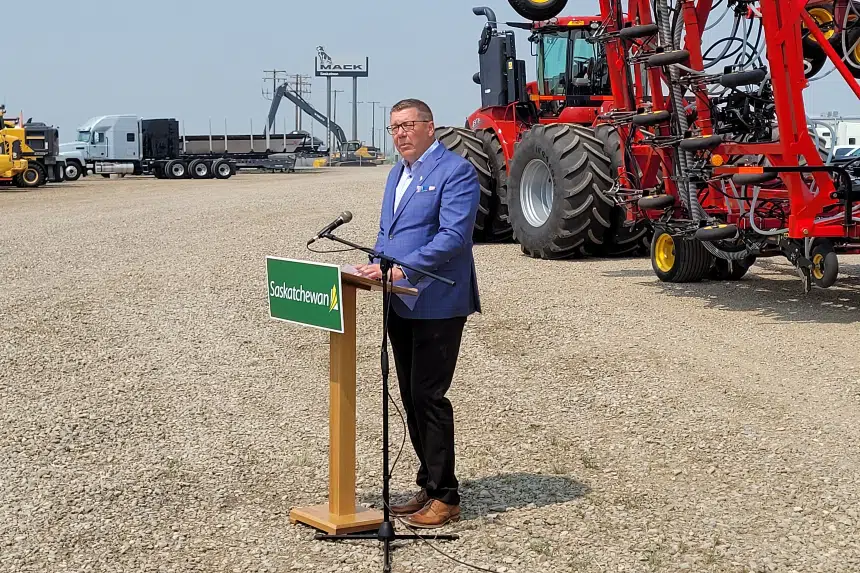Less than a day after finding out the province’s carbon pricing plan was being rejected by the federal government, Saskatchewan Premier Scott Moe still couldn’t understand why.
“We view this as a very arbitrary and quite problematic denial for the province of Saskatchewan,” Moe said Tuesday of Ottawa’s latest decision surrounding the carbon tax in Saskatchewan.
Speaking to reporters outside Saskatoon in the smoke-filled haze from northern wildfires, Moe was bewildered how his province’s carbon pricing plan to fight climate change was rejected yet again.
“Why we say this is an arbitrary decision by the federal government is we don’t see a good reason as to why they wouldn’t accept Saskatchewan’s plan, as it exceeds the minimum standard that is out there, which is really the strength of the Supreme Court ruling that is there,” Moe said in reference to the Supreme Court of Canada’s decision handed down in March.
“It didn’t say the federal government could do one plan in this province and a different plan in that province.”
Moe alluded to New Brunswick’s 2020 carbon tax plan, which was accepted by Ottawa.
Saskatchewan modelled its submission after New Brunswick’s, which called for a 6.6 per cent levy at gas stations before adjusting the provincial gas tax by more than four cents to leave consumers with a net cost of two cents per litre.
In a letter to Saskatchewan Environment Minister Warren Kaeding on Monday, federal Environment Minister Jonathan Wilkinson alluded to the very situation Moe laid out when announcing new benchmarks provinces must meet to fight climate change.
“The new benchmark will include requirements to ensure that government measures do not weaken the price signal, for example by giving instant rebates that are tied to the amount of carbon price paid or by explicitly reducing fuel taxes in order to offset the carbon price,” Wilkinson’s letter said.
One component of Saskatchewan’s plan was to take on the costs of the federal gas tax, saving roughly nine cents a litre at the pumps that would otherwise be passed on to the consumer, according to Moe.
The other was to try and bring SaskPower and SaskEnergy under its own performance-based standards by the start of next year.
By closing the loophole Saskatchewan was copying, Wilkinson said Ottawa will not be implementing any new submissions until January 2023 at the earliest.
However, Moe isn’t ruling out challenging the federal decision with another legal battle.
“We will continue to discuss our submission, and any steps we may take from here, up to and including some legal action,” Moe said, adding he has requested the Ministry of Justice to look into any and all options available.
“It may be a political decision with an election coming.”
Moe hopes this decision won’t linger or affect other negotiations with Ottawa after what he called “a very collaborative effort.”
“We’re really quite baffled,” Moe said.
Saskatchewan’s submission to the federal governments
The province hadn’t previously announced that it had finished a plan or that it had submitted it to the federal government. 980 CJME obtained a copy of the letter sent to the federal government May 3 looking for a carbon pricing benchmark.
The letter was written by David Brock — the assistant deputy minister in the Climate Change and Adaptation Division of Saskatchewan’s Ministry of Environment — to the assistant deputy minister in environment protection at Environment and Climate Change Canada, John Moffett.
In the letter, Brock wrote he believed that it would be enough to initiate a benchmark assessment and transfer authority to the province in time for it to take over next year, and to end the federal carbon tax in Saskatchewan.
The Government of Saskatchewan’s intention was to bring SaskPower and SaskEnergy under its own performance-based standards as of January 2022 and to take over the fuel tax the following April.
The letter laid out some of the details the program would entail.
Under the provincial fuel charge, Brock wrote Saskatchewan intended to meet the minimum federal pricing benchmark and continue to meet it as it’s raised in the next nine years.
New regulations to price emissions from electricity generation would use the emission intensity standard schedule included in the federal regulations. The plan would include flexible compliance options such as offset credits, performance credits, and payments in the Saskatchewan Technology Fund.
“The province will need to complete consultations in order to finalize the regulations and standard, but are committed to mirroring the emission intensity standard schedule in the federal OBPS regulations,” the letter read.
The Saskatchewan Technology Fund would be established and payment into it would be one of the compliance options available for large emitters. Brock wrote the price would be set at $40 per tonne of CO2 in 2021, and go up to $50 for 2022.
The natural gas sector would be included in existing provincial guidelines and each facility would have to get to a 10 per cent reduction below a baseline emission level across 12 reduction periods.
The letter also talks about how the province is drafting a standard for how performance credits would be awarded, traded and used “for compliance purposes.”
“Saskatchewan intends to implement the ‘10-15-20’ model for best performance credits that will award credits to regulated emitters at a 1:1 rate for eligible emissions below the applicable performance credit threshold,” Brock said in the letter.
Lastly, the letter talked about the creation of a greenhouse gas offset program. The development of the program was deferred to next year, according to the letter, to allow for consultations that couldn’t be done under COVID-19 restrictions.
“Saskatchewan recognizes the importance of managing credit supply and integrity. As a result, the offset program will be developed with robust quantification, verification and tracking requirements to real, additional credits are generated,” Brock wrote.
— With files from 980 CJME’s Lisa Schick







